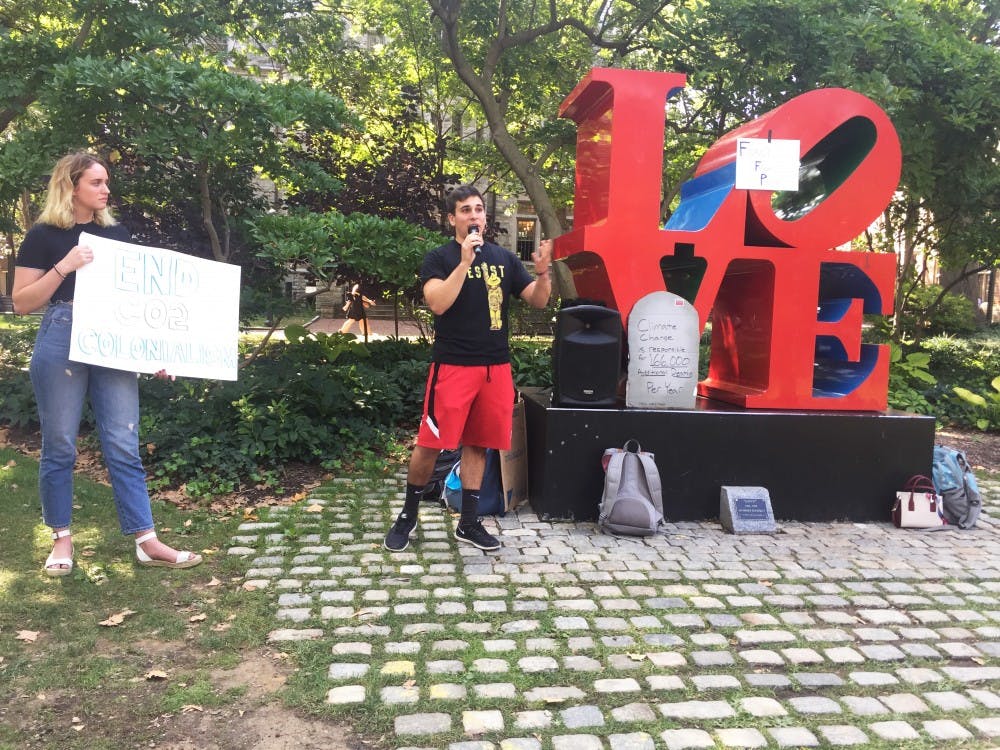
Last March, Fossil Free Penn staged a multi-day sit-in at College Hall, which amassed roughly 130 students on the final day of the protest.
Credit: Joy LeeAfter various protests and a highly publicized sit-in last semester, Fossil Free Penn is gearing up for another year of advocating for environmental justice at Penn.
Last semester, the group continued with its three-year effort to urge Penn to divest from fossil fuels, but saw little success. The group staged a multi-day sit-in at College Hall in March, which ended with roughly 130 students amassing on the final day of the protest. Sixty-nine students signed a form stating that they had stayed at the venue after the building had closed and approximately 13 of them were cited by the Office of Student Conduct.
FFP eventually ended the sit-in by leaving a document outlining its demands and promising that if action was not taken by September, they would return in full force.
True to their commitment, members of FFP have resumed their activism. Last week, a few core members of FFP organized a rally with other campus organizations to reopen the conversation about fossil fuel divestment. The goal was to remind returning students — and show new students — that FFP is an action-oriented organization with a strong presence on campus.
“I don’t think the sit-in was ineffective," said College junior and FFP Campaign Coordinator Zach Rissman, who worked to organized the sit-in last March. "I would say the actual process itself didn’t go much [as planned], but the symbolism was really there especially on the last day,”
In light of the University's unwillingness to cooperate, FFP has been hard at work planning its effort for the upcoming semester, Rissman added.
The group's demands do not currently include divestment from all fossil fuels, which Rissman said would only happen “in a perfect world." Instead, FFP is campaigning for Penn to divest from coal and tar sands companies, which some peer institutions such as Stanford University have already done.
“[Divesting from coal and tar sands is] still on the path to full divestment, but it’s a really easy and easily defendable first step because it’s already been proven to be effective and good for the actual endowment at peer universities," he said.
Rissman commended Penn for its efforts toward improving campus sustainability and promoting compost collection on campus, but added that these two steps aren't enough to combat climate change and don't measure up to the efforts taken by many of Penn's peer institutions.
Wharton sophomore and FFP Media Coordinator Megan Kyne said partially divesting from fossil fuels makes sense for the University from both an environmental and financial perspective.
“This is a financially logical decision and it can’t be used as an excuse to not take into account the implications of climate change," Kyne said. "I think divestment on every front makes sense for this school and is simply imperative in the face of climate change and how it affects every person on this planet."
2017 Wharton and Engineering graduate Thomas Lee agreed. In March, he published a guest column about the finances behind divestment, noting that divesting from fossil fuels generates high returns with low risk. "Had Penn divested in June 2016, we would have made $8.9 million extra (all with lower risk)," he wrote.
Rissman echoed this sentiment and said that he and the rest of FFP are committed to challenging the University to do more.
"At the end of the day, Penn investing in the fossil fuel industry is much worse and is condoning the actions that are immoral as a part of the fossil fuel industry," Rissman said. "It’s cool that Penn is at least trying to take some steps, but it’s really not enough."
The Daily Pennsylvanian is an independent, student-run newspaper. Please consider making a donation to support the coverage that shapes the University. Your generosity ensures a future of strong journalism at Penn.
Donate






